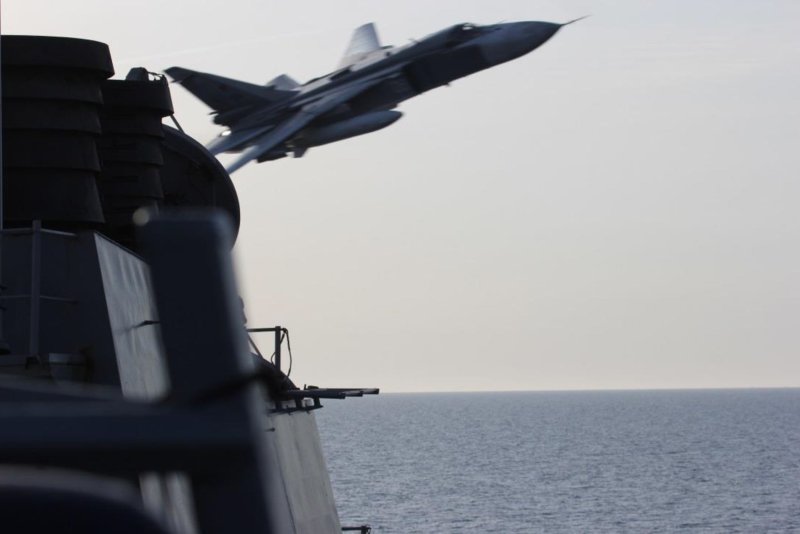1 of 2 | A Russian Sukhoi Su-24 attack aircraft makes a very-low altitude pass by the USS Donald Cook (DDG 75) on April 12, 2016, during maneuvers in international waters in the Baltic Sea. Donald Cook, an Arleigh Burke-class guided-missile destroyer, forward deployed to Rota, Spain, is conducting a routine patrol in the U.S. 6th Fleet area of operations in support of U.S. national security interests in Europe. Photo by U.S. Navy/UPI |
License Photo
WASHINGTON, April 13 (UPI) -- For two days in a row, Russian fighter jets conducted several aggressive, low-altitude passes above a U.S. Navy destroyer participating in maritime warfare exercises in the Baltic Sea.
The USS Donald Cook was carrying out landing deck drills with partner nation forces on April 11 when two Russian-flagged Su-24 fighter jets "made numerous, close-range and low altitude passes" above the vessel, according to a statement by Navy officials with U.S. European Command.
Navy commanders suspended the training mission until the jets left the area.
The following day, A Russian KA-27 Helix attack helicopter buzzed the Donald Cook, again forcing its crew to suspend ongoing flight operations. As the Helix continued to circle the deck, two more Su-24 fighters flew 11 aggressive, low passes over the ship, according to the Navy.
The fighters flew "in a simulated attack profile and failed to respond to repeated safety advisories in both English and Russian," Navy officials say.
"We have deep concerns about the unsafe and unprofessional Russian flight maneuvers. These actions have the potential to unnecessarily escalate tensions between countries, and could result in a miscalculation or accident that could cause serious injury or death," according to the Navy's statement on the incidents.
U.S. and Russian diplomats and military officials have held informal discussions about the incidents, while Navy leaders are conducting their own review of the Russian military's actions.















